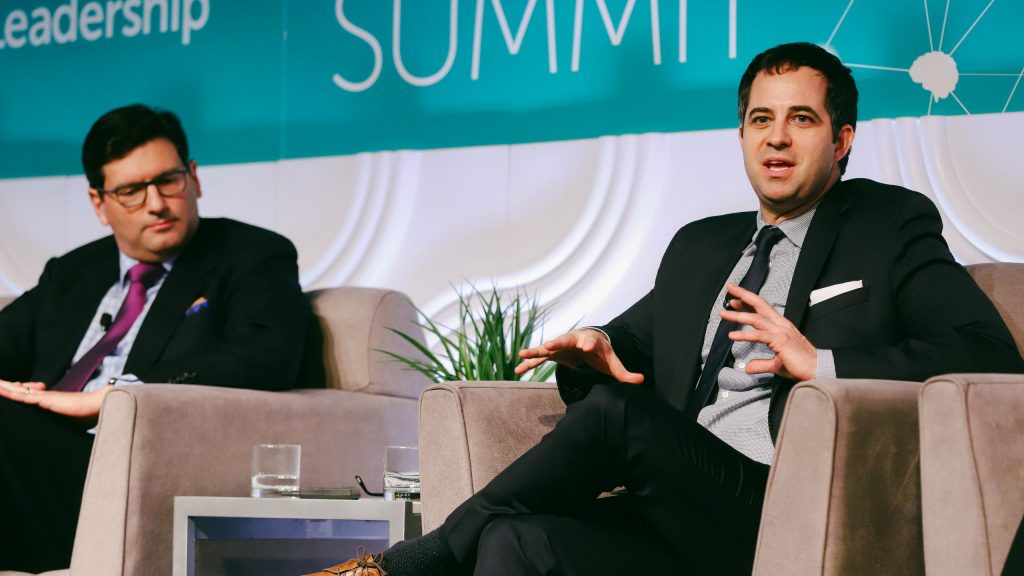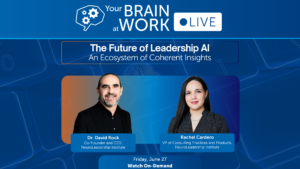In these unprecedented times, organizations have the opportunity (and the necessity) to use science to build a better normal. We’ve designed our annual Summit dedicated to that proposition.
Read on to learn more about the sessions, and the scientists who can help you do that at the NeuroLeadership Institute’s 2020 Summit.
The Science of Change
Elliott Berkman, PhD, University of Oregon, with Dr. David Rock, NeuroLeadership Institute; Andrea Derler, Ph.D., NeuroLeadership Institute; and Deb Bubb, IBM.
Understanding the science of change is the first step in taking advantage of this opportunity. This keynote session kicks off the 2020 NeuroLeadership Summit: Build a Better Normal.
Dr. Berkman is Professor of Psychology and Associate Director of the Center for Translational Neuroscience. He researches the motivational and cognitive factors that contribute to success and failure. Dr. Berkman says his research can help organizations manage change, as he notes “The gap between values and behavior is a major issue in workplaces, particularly during periods of change and upheaval.”
The Foundational Science of Bias: SEEDS
Jay Van Bavel, PhD, New York University, with Jon Martin, NeuroLeadership Institute; and Tracy Dodd, Tiffany & Co.
If you have a brain, you have bias. Understanding how bias works can equip your organization to make smarter decisions.
Dr. Van Bavel is an Associate Professor of Psychology and Neural Science, affiliated with the Stern School of Business in Management and Organizations. Dr. Van Bavel is also the Director of the NYU Social Identity & Morality Lab. He tells us that organizations can use his research to reduce bias to create more effective teams. He will be part of two sessions at this year’s Summit.
Equity, Fairness, and Justice
Molly Crockett, PhD, Yale University and Joe Magee, PhD, New York University, Stern School of Business, with Ester Neznanova, NeuroLeadership Institute.
As we strive to build a better normal, this is the right time to understand how these three concepts work together in our brains and in our organizations.
Dr. Crockett is Assistant Professor of Psychology and a Distinguished Research Fellow at the Oxford Centre for Neuroethics. She studies motivation neuroscience—the neural and psychological processes that support goals, motivation, and behavior change. To describe her work, Dr. Crockett cites philosopher Blaise Pascal’s description of human beings as “the glory and scum of the universe.’’ Her research seeks to understand how each of us carries blueprints for an astonishing range of social behaviors, from the heroic to the atrocious.
Dr. Magee is Professor of Management and Organizations at the Stern School of Business. He’s also affiliated with NYU’s Psychology Department and Wagner School of Public Service. Professor Magee’s research revolves around the roles of hierarchy: How power differences transform the way people think and behave and how people figure out who has power over whom. Dr. Magee and his colleagues discovered a series of reliable changes in the psychology of power-holders that could be damaging for relationships and organizations, or could actually contribute to interpersonal and organizational effectiveness.
Influence to Increase Buy-In
Lawrence Ian Reed, PhD, New York University, with Jon Martin, NeuroLeadership Institute; and Susan Ferrier, National Australia Bank.
Building a better normal will require commitment from everyone in the organization. Learn how to use your influence and secure that commitment.
Dr. Reed is Clinical Assistant Professor of Psychology engaged in research related to facial expression, emotion, and cooperation. His current research examines the communicative and commitment functions of facial expressions. Dr. Reed works to answer basic questions in the areas of emotion, evolutionary psychology, and clinical psychology such as “In what ways do expressions of emotion influence the behavioral responses of others?”
[action hash= “c74cc6c8-6eb0-45bf-9cc4-64043976bd57”]






